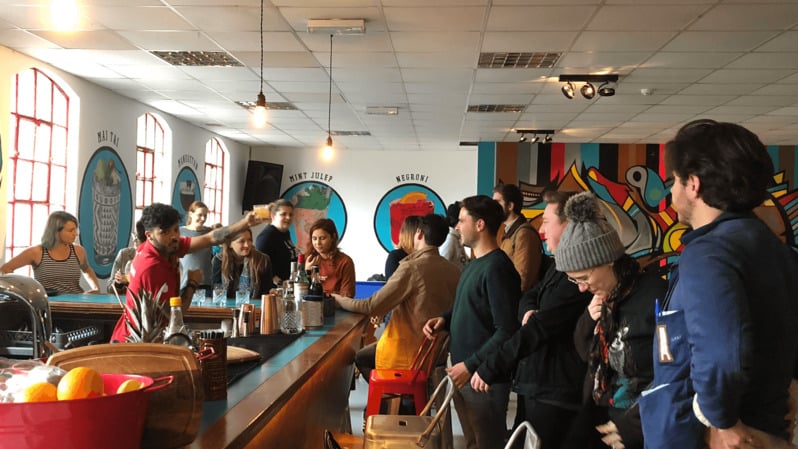Employee engagement matters. Yet, only 15 percent of employees are actually engaged in the workplace, according to Gallup.
A demotivated, disengaged team member is less creative and less productive. Worse, cynicism and disillusionment are contagious, leading to higher staff turnover and dysfunctional teams.
The flip side is that companies with high levels of engagement are significantly more profitable.
People are motivated by different things, as Dan Pink explains in this video, but there are some simple things you can try today to make things better.
How to improve employee engagement
1. Work on your company culture.
At my company, Articulate Marketing, ‘happiness’ is at the heart of our culture. We take happiness very seriously. It’s not some sugar-coated ‘just keep smiling’ idea. We invest in it. For example, we have a Chief Happiness Officer.
Here are some things you can do today to start work on your culture: read another company’s culture code, ask three colleagues for their suggestions for improving the culture, book a half-day workshop to brainstorm your own culture code. For more on this see: How to create a happy company.
2. Employee Net Promoter Score
Whatever gets measured, gets done. Try using an NPS score with your staff. Re-running the surveys regularly shows how your efforts to improve engagement are progressing. I can’t recommend this highly enough.

Work.bot sample screenshot showing reporting from Slack employee NPS surveys
3. Benchmark your business
B Corp has been transformational for my business. Over 18 months, we changed and grew as we worked towards the B Corp certification standard. It touched every part of the business and it has been hugely valuable for recruitment, retention and even winning new business. This year, we were recognised as being one of the top 10 percent of B Corps in respect of workers and governance.
We are already planning ahead for our recertification next year and we’re also working towards Investors In People certification. But all this started with two simple, initial steps: 1) doing the baseline B Corp Impact Assessment and 2) Doing an initial Investors in People assessment. You can get started for free with Investors In People’s Jumpstart app for Slack.
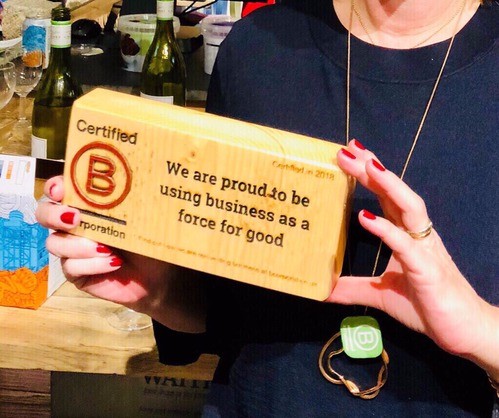
4. Know your Team
Know Your Team (formerly Know Your Company) is a spin-off from Basecamp and it’s a great way to get to know your colleagues, get updates on what people are doing and get real feedback on cultural issues that affect staff engagement. We used it for several years and I can recommend it very highly. You can try it free for 21 days.
You can also look at apps like Blink which foster engagement and simplify HR document sharing.
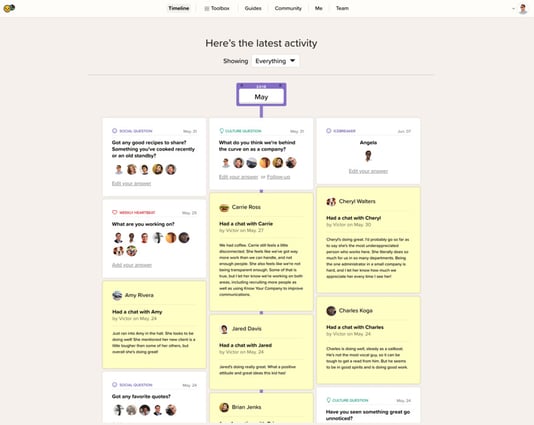
5. Formal surveys
We stopped using Know Your Team when we started doing different elements of the service in different ways. One thing that changed was that our Chief Happiness Officer started a monthly survey. She calls it her ‘happy-o-meter’ and it uses a really simple Google Forms questionnaire. She adjusts the questions each month depending on the needs of the business but several questions remain constant, including:
- On a scale of 1-10 how happy are you today?
- On a scal of 1-10, how much do you enjoy your job
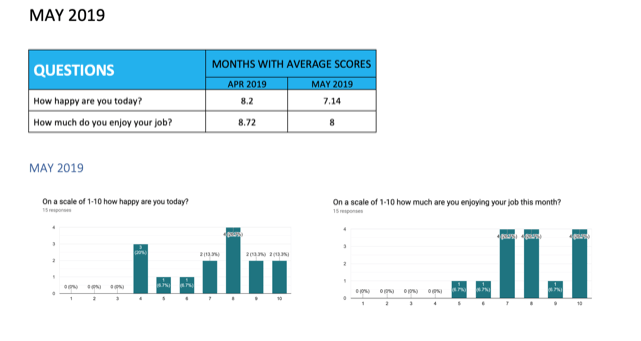
We don’t always score 10/10 but the changes from month to month give me and the team leaders valuable feedback on morale. It also helps us spot and, hopefully resolve, issues early on. You can’t rely on forms and numbers along: it has to be backed up by human interaction.
Apps like Typeform let you build employee evaluation questionnaires and other staff surveys very quickly. We use Typeform a lot at Articulate for marketing lead capture but it’s good for this stuff too.
6. Happy half hours and team leader 1-1s
Book up 1-1s with your team or a representative sample of your colleagues. Some simple questions can identify problems and opportunities for improvement. All my team leaders do monthly 1-1s with their team members.
I particularly respect this advice about running a 1-1 meeting from the great geek blog Rands in Repose. Also check out Claire Lew’s: 8 questions to ask during a 1-1 meeting. Liz, our chief happiness officer, also does a monthly 1-1s with everyone in the company but focused more on morale than work issues.
7. Cut the HR BS
So much of HR is just make-work. Get the busy manager’s guide to modern HR from my colleague Callum at Turbine for tips on streamlining the paperwork.
For routine, day-to-day admin, we use Turbine. This takes care of expense claims, purchasing and time off records online. (Full disclosure: I’m the founder of Turbine.)
8. Informal validation
Managers spend a lot of time on things like annual bonus calculations and pay reviews but a simple ‘thank you’ and public validation goes a long way and costs nothing. To do that at Articulate, we set up a ‘Validation Centre’ in Slack and it has become a big part of our culture for people congratulate one another. It’s not just a top-down manager thing – everybody validates everybody else. It happened in an organic way, not through my management fiat, and it’s one of the things about our culture that I am most proud about. Here are a few examples (out of thousands!)


9. Flexible working
Work doesn’t happen at work, according to Basecamp founder Jason Fried. Your office is killing your productivity. And, as I have said on this blog before, presenteeism is just as dangerous as absenteeism. That’s why we’re passionate about remote and flexible working. We’ve banished time sheets (hint: they’re evil) and we all work remotely. Here’s advice from my colleague Paul Morton about working remotely. Perhaps you could give your staff a half-day holiday on Friday afternoon? Or just encourage them to take a ‘holiday at work‘ from time to time.
10. Fruit baskets and healthy eating
One of our clients always has a selection of crisps, nuts and chocolate in their office. While the intention is good, I think the outcomes are not. This stuff isn’t healthy and doesn’t promote concentration. Instead, I recommend getting fresh, organic fruit into the office. I used to do this back in my Intelligent Games days and we usually had a fruit bowl in the kitchen. Now, it’s easier than ever to do this. Although we don’t have an office, Articulate bought everyone a fresh fruit and veg box last month from an organic, B Corp delivery company.
11. Encourage mindfulness
We give everyone at Articulate a company-paid subscription to the Calm app. It’s great for relaxation and mindfulness. Occasionally when I have trouble sleeping, I also find the app’s bedtime stories genuinely soporific. Alan Sklar FTW.
Bonus tip: get your own gin
We created Articulate Writers’ Gin a couple of years ago with the help of genius distiller Will Lowe from The Cambridge Distillery. We give a bottle to new hires soon after they join. Because I’m a bit of a wine geek, we also give people bottles of wine from Vincarta for their birthday but that’s another story.
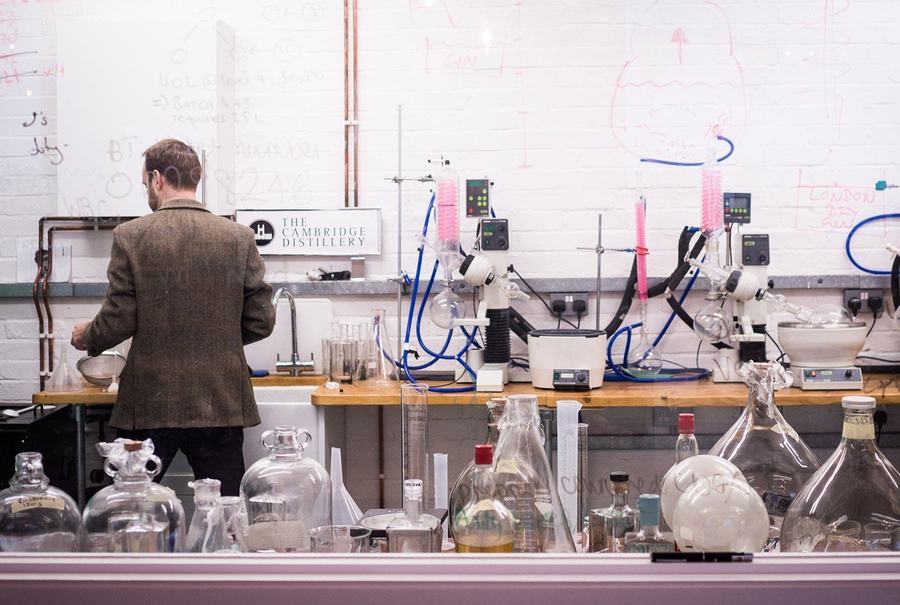
The gin is lighthearted and fun but it creates a memory, as you can see from this video that my colleagues created. And storytelling is an important part of building an engaged, happy workforce. We are, after all, the stories we tell about ourselves.
